Poetry, Prophets, and Post-War Panic—With Bonus Footnotes Nobody Asked For
ABS Believes:
Some poems whisper. This one throws a shattered mirror at you and dares you to find meaning in the reflection.
T.S. Eliot — The Man Who Made Confusion Profound
(From mental fog to footnotes, and still somehow Nobel-worthy)
Before there were lyrics about heartbreak on Spotify, there was The Waste Land—a five-part, footnote-filled existential mixtape penned by one Thomas Stearns Eliot, a man who looked like a banker, dressed like a bishop, and wrote like a prophet with Wi-Fi issues.
Born in 1888, Eliot came into the world in St. Louis, Missouri (yes, poetry’s patron saint of confusion was an American), before migrating to Britain and promptly becoming more English than the Queen’s tea. He had the soul of a tortured monk and the lifestyle of a stressed-out librarian. His hobbies included writing highbrow verse, marrying disastrously, and intellectualizing the end of civilization—casually, over tea.
Now, why did this bespectacled bundle of nervous brilliance write The Waste Land?
Because the world was on fire—and not in the sexy, Instagram way.
After World War I left Europe intellectually amputated and spiritually anaemic, Eliot—like many artists—picked up the pen and asked: “What even is the point of anything anymore?”
But instead of giving answers, he gave us fragmented stanzas, a talking clairvoyant, mythological trivia, bits of Sanskrit, and about 433 lines of poetic whiplash.
Originally drafted in a flurry of nerves, coffee, and probably mild panic, The Waste Land was a poetic hot mess. So Eliot did what any overwhelmed genius does—he sent it to his friend Ezra Pound, hoping for guidance. Pound, upon reading it, likely blinked twice and whispered,
“This needs footnotes.”
And thus, the poem grew weirder and longer, acquiring scholarly baggage like a Victorian lady collects shawls. Eliot eventually attached explanatory notes—not to clarify, mind you, but to complicate things in a way that screamed:
“This is modernism, darling. If you get it, you’re doing it wrong.”
Though only about 433 lines long, The Waste Land feels like it ate twelve epics and then forgot to burp. Each stanza is compressed like a black hole of meaning. The result? A dazzling, confusing, breathtaking wreckage of genius.
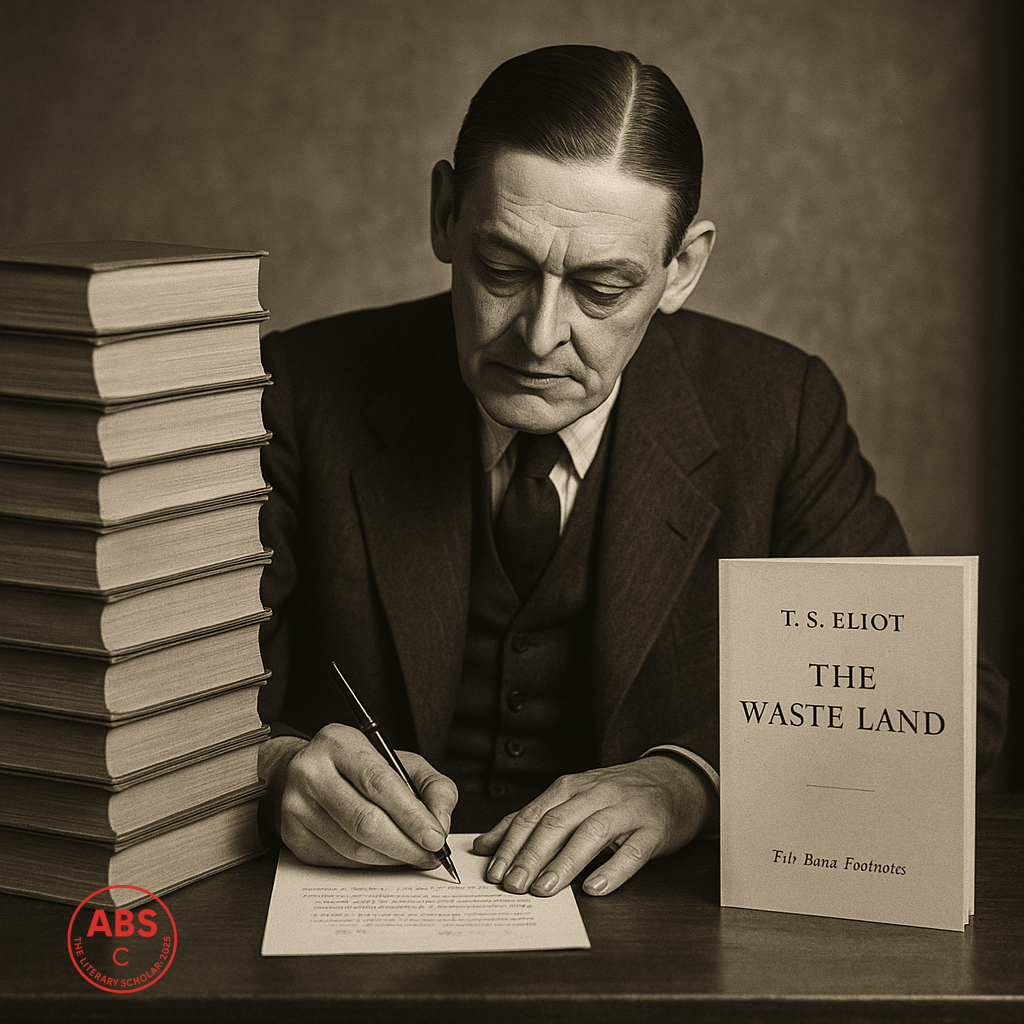
The Background of a Broken World
World War I, nerves, and why poetry became a philosophical scavenger hunt.
When T.S. Eliot penned The Waste Land, he wasn’t writing from a comfy corner of a mahogany library with a wine glass and inspiration. He was writing from the ruins—mental, moral, and military.
The year was 1922. The world had just finished its most successful attempt at destroying itself: World War I—a war so horrific, it made poets allergic to coherence. Trenches had replaced gardens, gunfire had replaced birdsong, and young men were sent off to die for countries that couldn’t explain why. When the smoke cleared, Europe wasn’t a continent—it was a graveyard with PTSD.
Enter Eliot. Nervous. Overworked. Emotionally frayed. Spiritually hoarse. Also working at a bank.
The Waste Land became his therapy session in verse—only the therapist was absent and the couch was on fire.
What had once been romantic poetry filled with daffodils and dancing muses now became a jigsaw puzzle made entirely of despair. The war had killed the old gods, and modern poets were left with ruins and rage. Eliot’s answer was not to sing about the ruins—but to echo them. Fragmentation became form. Confusion became technique.
“These fragments I have shored against my ruins…”
That’s not metaphorical melancholy—it’s a man trying to rebuild meaning from cultural compost.
So yes, the poem is divided into five sections. Yes, there are about five languages involved. And yes, if you feel lost, you’re reading it correctly.
But Eliot’s chaos wasn’t just emotional—it was classical. Enter mythology.

Mythology, Madness, and Tiresias’s Bad Day
(Because no modern poem is complete without blind prophets, angry goddesses, and a sprinkle of ancient trauma)
Now that we’ve met the poet and peeked into his nervy, postwar brain, it’s time to decode the mythological mess that Eliot used as scaffolding for The Waste Land. Because make no mistake—this poem isn’t just modern despair in stylish fragments. It’s also an archaeological dig through Western mythology with a slightly judgmental flashlight.
Let’s start with Tiresias—Eliot’s favorite psychic disaster.
Tiresias was the ancient equivalent of someone who accidentally walked into a divine changing room and never emotionally recovered. According to myth, he saw Artemis (or Diana, depending on which version is trending) bathing. Naturally, she didn’t respond well to surprise spectators and struck him blind. But wait—plot twist—Tiresias’ mother was close friends with the goddess, so to make up for the whole optic incident, Diana gifted him second sight. Moral vision in exchange for eyeballs? Mythology’s full of such customer service loopholes.
Oh, and just to make it weirder: Tiresias also lived part of his life as a woman. (Long story involving snakes, divine punishment, and some unsolicited gender studies.)
So, when Eliot says Tiresias sees everything, he means it:
“I Tiresias, though blind, throbbing between two lives…”
Yes. That line exists. And no, you don’t need to explain it at parties.
Tiresias becomes the central, silent observer of the poem’s dysfunction: sterile marriages, lust without love, prayers without gods, London without soul. He is Eliot’s all-seeing, all-suffering, ambiguously-gendered narrator—because who better to watch a civilization collapse than someone who’s been through it in both high heels and sandals?
But wait—there’s more myth!
The Fisher King—a wounded guardian of the Grail. Impotent. Bleeding. Trapped in a sterile land. Sound familiar? Yes, that’s Europe in 1922. And probably Eliot’s marriage.
Lady Diana/Artemis—goddess of the hunt and goddess of poetic revenge. Also the reason Tiresias was issuing spiritual commentary instead of Instagram selfies.
The Sibyl at Cumae—quoted in the poem’s very opening with those immortal words:
“I want to die.”
A prophetic mood, if ever there was one.
Eliot doesn’t just reference myths—he stitches them into the backbone of the poem. Why? Because modern life felt mythically broken. And when reality feels like a disaster, we look to myths—not to find meaning, but to realize it’s always been a mess.
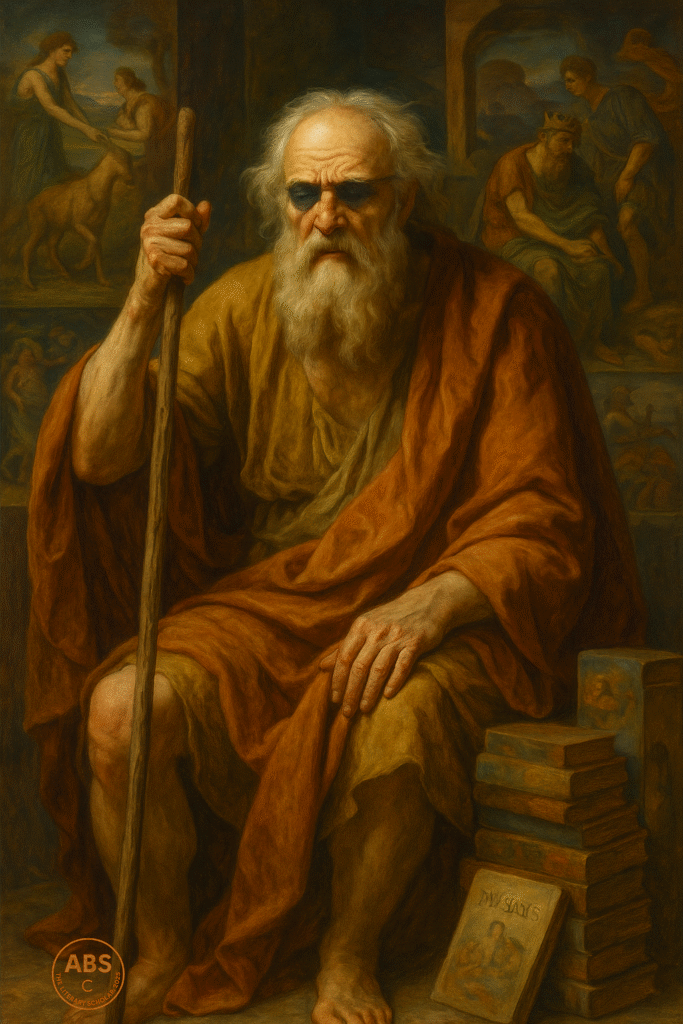
The Waste Land Part One
The Burial of the Dead
(Where April shows up uninvited, memories overstay their welcome, and seasonal depression gets poetic)
“April is the cruellest month…”
Really? April? Not January with its post-holiday existential hangover? Not August with its sweat-soaked self-loathing? No—Eliot, in all his fragile brilliance, decides that spring, the season of hope, is the one worth dreading.
And that’s how The Waste Land begins: by giving Mother Nature a side-eye.
This opening line is now legendary—and also mildly petty. But it’s Eliot’s way of flipping poetic tradition. In most poems, April brings cherry blossoms and flirtatious metaphors. In The Waste Land, it brings psychological excavation. Because, as Eliot suggests, when things bloom, so do buried memories. And let’s face it, no one enjoys emotional spring cleaning.
“Winter kept us warm, covering
Earth in forgetful snow…”
Eliot: the only man in poetry who finds comfort in numbness. Here, winter isn’t cruel. It’s kind. It wraps you up, numbs your heart, and lets you live in denial—like a poetic weighted blanket. Spring, on the other hand, melts the ice and digs up all your repressed metaphors.
A Stroll Through Dust and Disillusion
“I will show you fear in a handful of dust.”
What sounds like an ominous weather forecast is actually one of Eliot’s most powerful lines. “A handful of dust” is death, decay, the residue of all things grand and gone. It’s also what your ambitions become when modernity steamrolls over meaning. And he says he’ll show you that fear—as if offering a guided tour through your crumbling hopes.
Modernist poetry, folks: come for the beauty, stay for the existential dread.
And yet, it’s not all gloom. There’s also absurdity.
Suddenly, Madame Sosostris enters—a clairvoyant with “a wicked pack of cards”, who seems less like a mystic and more like a tarot reader on too much caffeine.
“Here, said she, is your card, the drowned Phoenician Sailor…”
He’s wet, he’s symbolic, and he’s here to confuse you.
Madame Sosostris tosses out omens like candy, spouting Tarot cards and cryptic warnings. Is she a serious prophet? A fraud? Eliot leaves that up to you, which is his favorite hobby.
Because in The Waste Land, everyone is speaking—but no one is communicating.
Wading Through Memory and Munich
We’re suddenly thrown into fragmented memories of Europe—specifically, a snowy day in the Hofgarten, with someone named Marie, sliding around on a sled, then reading poetry in a tower.
“I read, much of the night, and go south in the winter.”
Marie could be real or fictional or a symbolic stand-in for the Austro-Hungarian Empire’s faded glamour. Either way, she reads, she slides, and she’s cold.
This blend of high culture and vague trauma becomes the signature Eliot cocktail—served neat, with a lemon twist of confusion.
And somewhere in all of this, London appears—not as a vibrant city, but as a funeral parade.
“Unreal City
Under the brown fog of a winter dawn…”
Eliot’s London isn’t romantic. It’s grey, ghostly, and full of hollow-eyed people trudging to jobs that mean nothing, in a world that’s forgotten how to feel. The industrial world has arrived—and it brought fog, detachment, and a shortage of spiritual Wi-Fi.
Tiresias Sneaks In (Kind Of)
Though not named yet, Tiresias, the ancient seer we met earlier, is beginning to observe. You can feel the gaze—detached, slightly disappointed, and possibly allergic to your excuses.
By this point, we’ve covered fragments of memory, weather-based anxiety, dusty death, and a fraudulent psychic. And this is just the first part.
ABS’s Interjections (Because Eliot Wasn’t Sarcastic Enough):
“April is the cruelest month” is what you say when even your seasonal allergies have commitment issues.
Eliot doesn’t write poems. He leaves breadcrumbs in a maze, blindfolds you, and whispers in Latin.
Winter kept him warm? Clearly, he never dealt with gas bills.
Marie goes south for the winter. So do confused readers.
Why “The Burial of the Dead” Feels Like a Wake with Literary Hors d’oeuvres
The title sounds dramatic, and it is. But Eliot isn’t just burying bodies—he’s burying meaning. Or rather, unearthing the remains of meaning in a world that’s spiritually frostbitten.
The entire section dances between beauty and dread, memory and mockery, mythology and migraines. It’s brilliant. It’s maddening. It’s poetry that dares you to understand it—and laughs when you think you do.
ABS, The Literary Scholar, Thinks:
Eliot doesn’t ease you into the poem. He throws you in, blindfolded, holding a cracked mirror and muttering something in German. The Burial of the Dead is not just a beginning—it’s a psychological detonation. Everything here—spring, snow, dust, tarot cards, fog—feels off. And that’s the point.
ABS believes:
Eliot doesn’t want to “explain” life after the war. He wants you to feel how fractured it became.
Each line is a shard. Each image is a ghost. If you understand it all too easily, you’re probably doing it wrong.
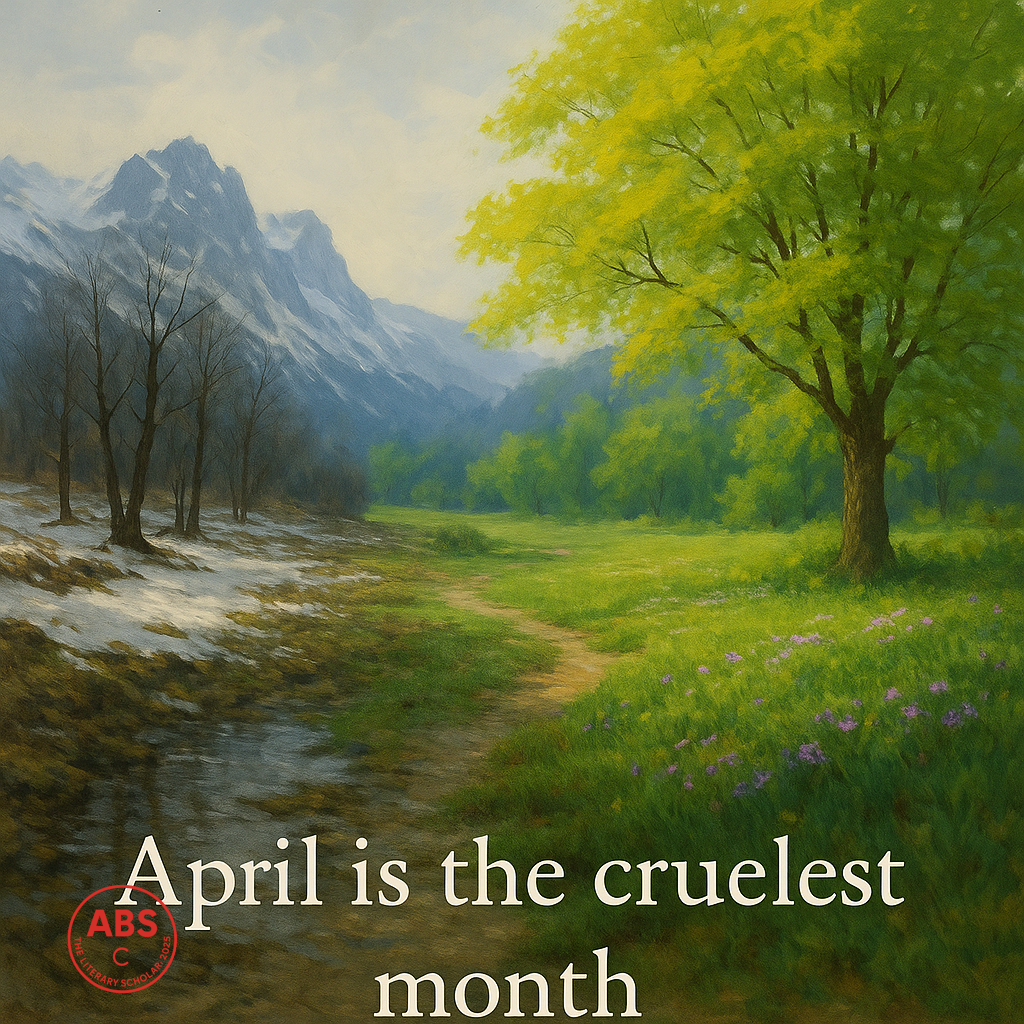
A Game of Chess
Where Love is Loud, Women are Tired, and Everyone Is Yelling in Verse
Part II of The Waste Land drops us from the philosophical fog of dusty death into something much more disturbing: a conversation—specifically, the kind where nobody is actually listening.
Eliot now moves from symbolic weather complaints to the sterile interiors of modern relationships. If “The Burial of the Dead” was spiritual confusion, “A Game of Chess” is domestic warfare wrapped in perfume and lit by electric light.
The Opulence of Emptiness
“The Chair she sat in, like a burnished throne,
Glowed on the marble…”
Well well. Someone’s been redecorating like a minor Greek goddess on payday.
Eliot opens this section with what sounds like a luxurious scene straight out of a neoclassical catalogue. We’re shown a woman seated on a shimmering throne-like chair, surrounded by fragrant oils, jewel-toned lights, and enough decorative detail to make Marie Antoinette say, “Girl, calm down.”
But it’s all surface. The grandeur is suffocating.
“strange synthetic perfumes,
Unguent, powdered, or liquid…”
It’s a world of artificial beauty, masking inner decay. Eliot’s not impressed—he’s choking on the lavender.
This woman—this anxious, perfumed, magnificent wreck—is trapped in luxury, yet starved for connection. The poem shows that even surrounded by wealth, one can drown in emptiness.
Dialogue or Duel? You Decide.
Then comes the dramatic shift: a modern conversation between a woman and a man that feels more like a scene from an absurdist play than an exchange of affection.
“Speak to me. Why do you never speak? Speak.”
She’s not just asking—she’s pleading, like someone trapped in a room full of echo and wallpaper. And the man? His replies are as emotionally engaging as a broken vending machine.
“What are you thinking of? What thinking? What?”
“I think we are in rats’ alley
Where the dead men lost their bones.”
Translation: “We don’t talk anymore. Also, I may be spiritually decomposing.”
Eliot’s vision of love is not candlelit sonnets. It’s two people failing to reach each other across a chasm of overused words and underfelt emotions.
The Hair Scene (Yes, That One)
“My nerves are bad tonight. Yes, bad. Stay with me.
Speak to me. Why do you never speak?”
This is not a woman seeking conversation—this is someone begging for connection through the static of modern life. She’s combing her hair, pacing the floor, repeating herself—everything screams restlessness, like a Shakespearean heroine stuck in a 20th-century marriage.
“Do you know nothing? Do you see nothing? Do you remember
Nothing?”
Congratulations. You’ve now entered a relationship powered entirely by rhetorical questions and passive-aggressive tension.
Pub Talk, Pint Misery, and Lower-Class London
Just when you’ve adjusted to gilded emptiness, Eliot shoves you into a London pub where the conversation is cheaper, louder, and ten times more depressing.
Two working-class women discuss their friend Lil, who’s had “five already” and is being advised to “get a new set of teeth.”
“When Lil’s husband got demobbed, I said—
I didn’t mince my words, I said to her myself…”
These are not refined tea-sipping ladies. These are weary women measuring life by pregnancies, pills, and the price of gin. Their dialogue isn’t poetic—it’s brutally real, full of slang, gossip, and unshed tears.
And yet, here, life feels more honest than in the perfumed marble room.
“HURRY UP PLEASE IT’S TIME”
This haunting line, shouted repeatedly by the pub landlord, becomes more than just last call. It becomes a refrain for modern urgency—time running out on relationships, bodies, and civilizations that once pretended to be permanent.
ABS, The Literary Scholar, Thinks:
If Part I was about death and spiritual silence, Part II is about noise—frantic, empty, exhausting noise. Relationships are performative. Love is mechanical. Everyone is speaking, but no one is heard. Eliot’s genius lies not just in what he says—but in how he captures the fatigue of living in a world where intimacy has become background noise.
ABS believes:
Modern love isn’t tragic—it’s tired. And in this scroll, Eliot doesn’t break our hearts. He shows us that they’ve already been replaced with voicemail.

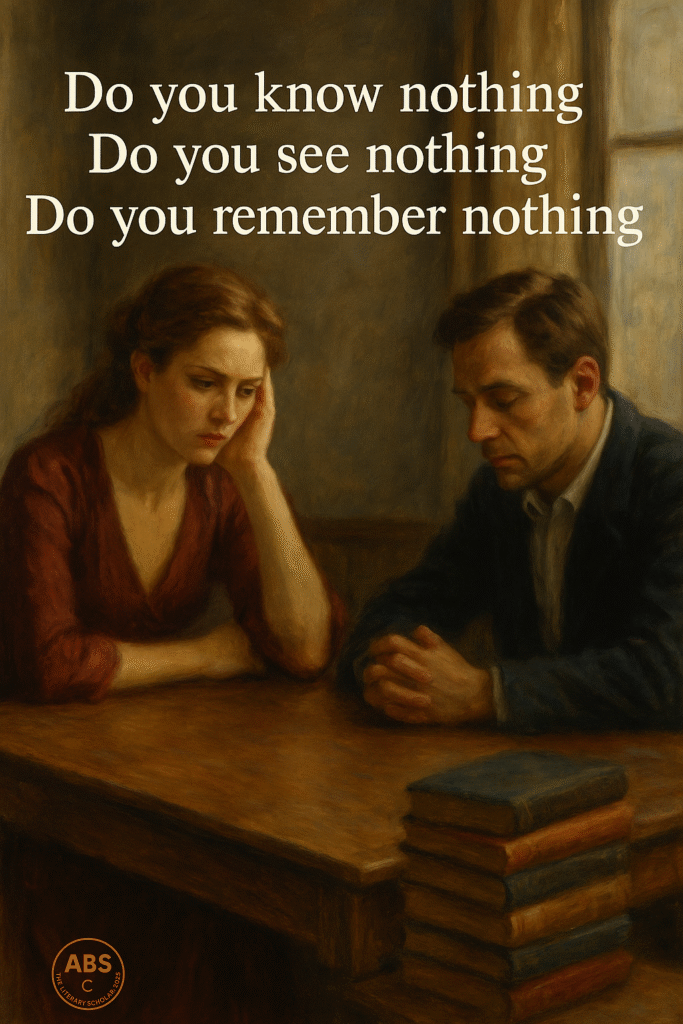
The Fire Sermon
Where Nature Smells Weird, Lust Gets Awkward, and Buddha Regrets RSVPing
If A Game of Chess was two people emotionally ghosting each other in velvet, The Fire Sermon is the morning after—but not the romantic kind. This is spiritual indigestion, post-war hangover, and a sensual disaster narrated by a blind prophet who’s just tired of everyone’s nonsense.
This section is where Eliot flings us into the swampy reality of the modern world: rivers that stink, sex that shrinks the soul, and enlightenment that shows up late with nothing but a Sanskrit quote and some mild hope.
Nature’s Out of Order. Please Contact Maintenance.
Forget Wordsworth’s daffodils. Eliot’s nature is over it.
The Thames, once a dreamy symbol of British poetic pride, is now basically a smelly canal with commitment issues. The river “bears no empty bottles” and “no silk handkerchiefs”—not because it’s clean, but because even the trash is done trying.
This isn’t the Romantic river of moonlight musings.
It’s the afterparty of industrial progress—and the party was bad.
ABS Translate-o-Meter:
“The river’s tent is broken.”
= “Even nature wants a divorce.”
Lust, But Without the Netflix Subscription
Then Eliot swings the spotlight to what might be the least sexy sex scene in poetic history. It’s not erotic. It’s not tragic. It’s… beige.
A man “assaults at once,” and the woman’s response is so underwhelming it makes wallpaper look emotionally available.
No music swells. No candles flicker. The most passionate thing in the room is probably the radiator.
ABS Paraphrases:
Romantic expectations: “Eyes met across the room.”
Eliot’s version: “Hands met. No one flinched.”
This isn’t about consent or control. It’s about disconnection.
Desire here is tired, mechanical, and possibly on autopilot.
It’s not that love is dead—it’s that it called in sick and left no forwarding address.
Tiresias Is Watching. And Honestly, He’s Seen Worse.
Finally, Eliot names the mysterious watcher lurking in the background like a literary ghost: Tiresias—the blind, ancient prophet who’s lived as both man and woman and frankly, has had enough of all this nonsense.
Tiresias doesn’t interrupt. He observes.
Because when you’ve lived through mythological gender reassignment, accidental divine blinding, and now modern London, nothing shocks you anymore.
ABS Imagines Tiresias Thinking:
“Same story. Different genders. Still disappointing.”
He is the still point in Eliot’s chaotic whirlpool.
The eye of the storm. The original, ungendered literary fly on the wall.
Burning… Burning… Still Burning… Can Someone Call Buddha?
Just as things sink into poetic swamp-misery, Eliot pulls a U-turn and quotes the Buddha’s Fire Sermon, a spiritual plea to let go of earthly desires.
“Burning burning burning burning…”
This is not a rave chant. This is spiritual combustion.
Everything is on fire—lust, thoughts, regrets, metaphors.
The plea: pluck me out of this mess, O Lord.
The subtext: Please, I beg you, unplug my brain.
Eliot isn’t mocking Buddhism—he’s leaning into it, because he knows there’s no salvation in the city, no ecstasy in the flesh, and no clarity in the mirror.
ABS, The Literary Scholar, Thinks:
The Fire Sermon is not just about spiritual agony.
It’s about how boring agony can become when it’s daily, ritualized, and sold as passion.
This section doesn’t burn with romance—it simmers with exhaustion. Eliot isn’t judging anyone—he’s just tilting his head and saying:
“This? This is what it’s come to?”
And Tiresias? Tiresias is just quietly lighting incense and whispering,
“Told you so.”
ABS Believes:
The world didn’t fall apart in fire—it wilted in lukewarm habits.
And the only thing worse than unfulfilled desire is pretending it’s still exciting.
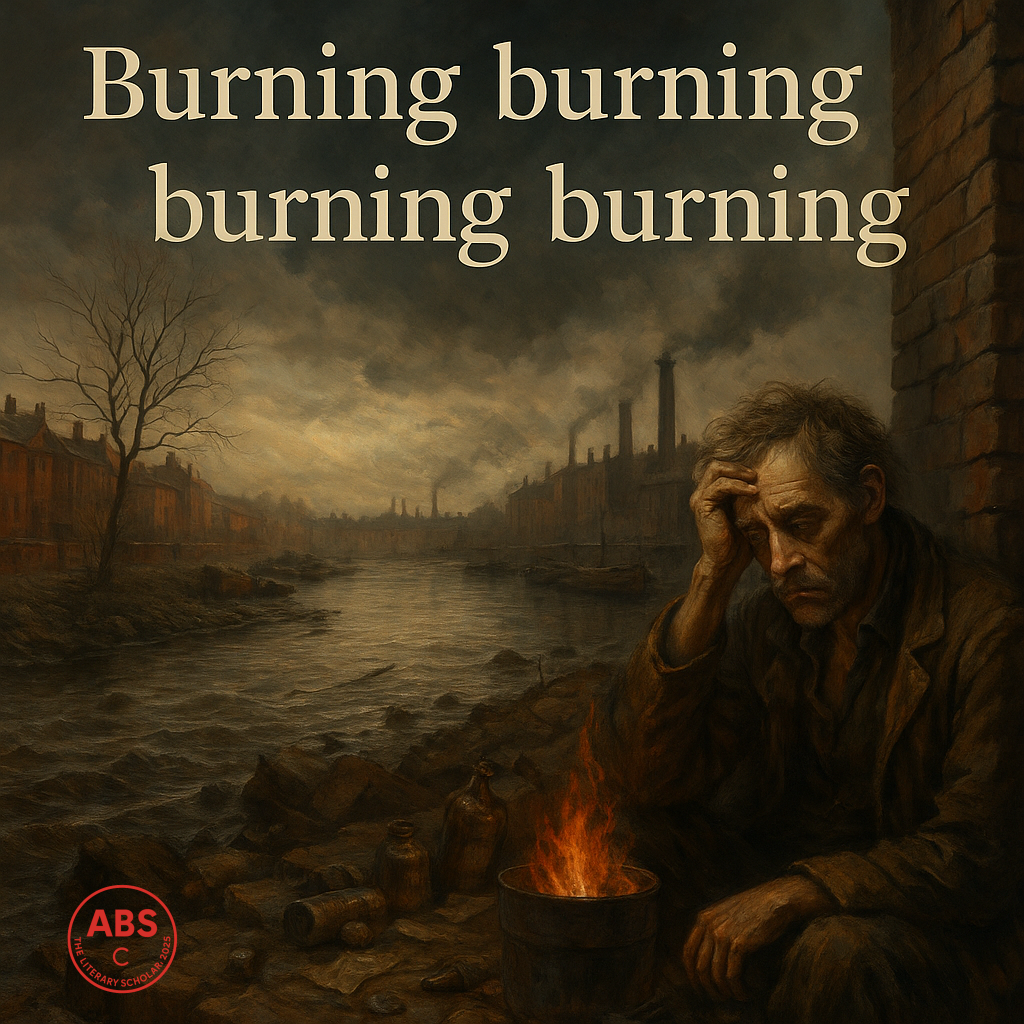
Death by Water
Where Drowning Is Quick, The Metaphors Are Heavy, and The Sailor Probably Skipped His Swimming Lessons
And now, we pause the noise. Death by Water arrives like a chilling exhale—short, sudden, and soaked in finality. After all the flames and confusion, Eliot gives us the most peaceful image in the poem: a man drowning.
Meet Phlebas the Phoenician—a man who used to be alive, worldly, and possibly insufferably stylish. Now, he’s sinking elegantly below the surface, past fish, bubbles, and forgotten dreams.
“Phlebas the Phoenician, a fortnight dead,
Forgot the cry of gulls, and the deep sea swell
And the profit and loss.”
In just a few lines, Eliot gives us what most poets need an entire epic to say: you die, and none of it—none of it—follows you down.
No applause.
No balance sheet.
No dramatic string music.
Just water, weightlessness, and a permanent goodbye to ambition.
Forgetfulness Comes in Waves
There’s something eerily serene about this section. Phlebas doesn’t rage. He doesn’t even resist. He simply forgets. The sea strips him of sound, memory, spreadsheets, and ego.
“He passed the stages of his age and youth
Entering the whirlpool.”
It’s less a drowning, more a cosmic erasure.
Modernism, but make it aquatic.
ABS Paraphrases:
Life: “Strive, achieve, shine.”
Eliot: “Float, forget, dissolve.”
In a way, Death by Water is the most honest love letter to futility ever written. It’s calm, compact, and completely disinterested in your philosophical objections.
Also, Phlebas Was Hot. Probably.
Let’s not ignore this: Eliot throws in a subtle humblebrag that Phlebas was once handsome. As if to remind us that youth and beauty are also excellent swimmers—until they’re not.
ABS’s Translation:
Even good looks can’t float forever.
(Botox can delay death, but not depth.)
Water, the Ultimate Critic
While fire in The Fire Sermon burned with confusion and craving, water simply deletes you. It’s the cleanest metaphor for mortality in the entire poem: silent, impartial, and incredibly efficient.
Unlike Madame Sosostris’s tarot readings or Tiresias’s cosmic CCTV commentary, Death by Water doesn’t overexplain. It just sinks.
And honestly? That makes it the most terrifying.
ABS, The Literary Scholar, Thinks:
This section is like that friend who doesn’t argue in a fight—just stares silently until you start apologizing to yourself.
Death by Water doesn’t need drama.
It just reminds you that all drama ends the same way.
ABS believes:
We rise, we race, we rant. And then the sea forgets us—politely.
Drowning, in Eliot’s world, is not punishment. It’s punctuation.

What the Thunder Said
Where Mountains Echo, Cities Burn, and the Universe Sends Mixed Signals in Sanskrit
The poem ends, not with a whimper, not with a bang, but with a thunderclap and a crash course in Upanishadic ethics. After dragging us through four acts of emotional ruin, spiritual bankruptcy, erotic collapse, and soggy existentialism, Eliot finally does something rather unexpected.
He looks East.
And not in the “I’ve just started yoga” kind of way. He dives into Sanskrit. Into the Upanishads. Into Vedic wisdom that predates European despair by a few thousand years.
Because The Waste Land wasn’t just a poetic tantrum. It was a search. And by this final section, Eliot had scoured the West and found it full of dust and pub noise. So he turned to the East, hoping it would at least offer a footnote that made sense.
Scene One: Apocalypse, But Make It Spiritual
“After the torchlight red on sweaty faces
After the frosty silence in the gardens
After the agony in stony places…”
Everything’s breaking. There’s thunder in the mountains. People are running through deserts. Water is nowhere, yet everyone’s drowning emotionally.
This is post-war Europe meets spiritual schizophrenia. Civilization has hit reset—again—and nobody knows who’s supposed to hold the charger.
ABS translation:
It’s the spiritual equivalent of seeing smoke, hearing thunder, and realizing your fire alarm is just playing jazz.
The Gods Have Spoken. In Syllables.
And then… Da.
Just Da.
Not Da Vinci. Not Daenerys. Just… Da.
Three times.
Datta. Dayadhvam. Damyata.
Give. Sympathize. Control.
Yes, this is the Upanishadic mic drop. The gods, the humans, and the demons all heard the same thunder—and each interpreted it according to their wiring.
Datta (Give):
Humans, in our overachieving glory, forget generosity unless thunder yells it at us.
It’s not about giving leftovers. It’s about giving of the self—vulnerability, honesty, a little less ego, maybe your Netflix password.Dayadhvam (Sympathize / Be Compassionate):
The demons—cold, calculated, control freaks—hear this and remember: maybe stop chewing people’s souls for breakfast.
Compassion isn’t weakness. It’s remembering that the person across from you is not an obstacle, but a mirror.Damyata (Control):
The gods hear this and remember even divinity needs discipline.
Power without control is a poetic disaster—and Eliot’s been showing us four sections of that.
ABS believes:
These three aren’t just instructions.
They’re diagnoses.
Krishna, Thunder, and Govardhan on the Side
And just as the landscape crumbles around us, Eliot gives a nod to Indian mythology—specifically, to that delightful moment when Lord Krishna lifted Mount Govardhan to protect villagers from torrential rain.
“When the jungle crouched, humped in silence…”
Yes, this is nature coiling like it remembers something divine. In the middle of Eliot’s thunderstorm, there’s a flashback to a myth where God doesn’t punish, but shelters. Not with fire and brimstone, but with the lift of a mountain and a reminder that storms don’t last forever.
It’s quiet. It’s powerful. It’s not Western panic.
It’s Eastern calm.
And Then… It Ends. With Peace. Sort Of.
“Shantih shantih shantih”
The traditional Vedic ending. Three times. For emphasis. For echo. For desperately hoping someone is listening.
It’s not an answer. It’s not even closure.
It’s a chant for inner stillness, because outer peace is apparently on sabbatical.
ABS paraphrases:
“This scroll was stressful. Please breathe. Deeply.”
The Scroll Comes Full Circle
Let’s remember where we began:
April was cruel.
People were dusty.
Madame Sosostris was sick.
Phlebas drowned in 433 lines of metaphor.
And Tiresias watched like an ancient Netflix subscription.
And yet—through all the fog and fragmentation, Eliot ends with a formula, a prayer, a path:
Give. Feel. Restrain.
Shantih. Shantih. Shantih.
ABS, The Literary Scholar, Thinks:
If The Waste Land was a nervous breakdown written in footnotes, What the Thunder Said is its yoga session.
Eliot doesn’t end with certainty—he ends with possibility.
Not because the world is fixed. But because you might be.
In the wreckage of a West that no longer knows how to mean, Eliot turns to the East—not as a tourist, but as a seeker.
And the thunder? It doesn’t preach. It just syllables its way into your bones.
ABS Believes:
If the modern world is fragmented, let the soul be stitched with silence.
The answers won’t come from noise—they come from thunder…
…followed by what you do with the echo.
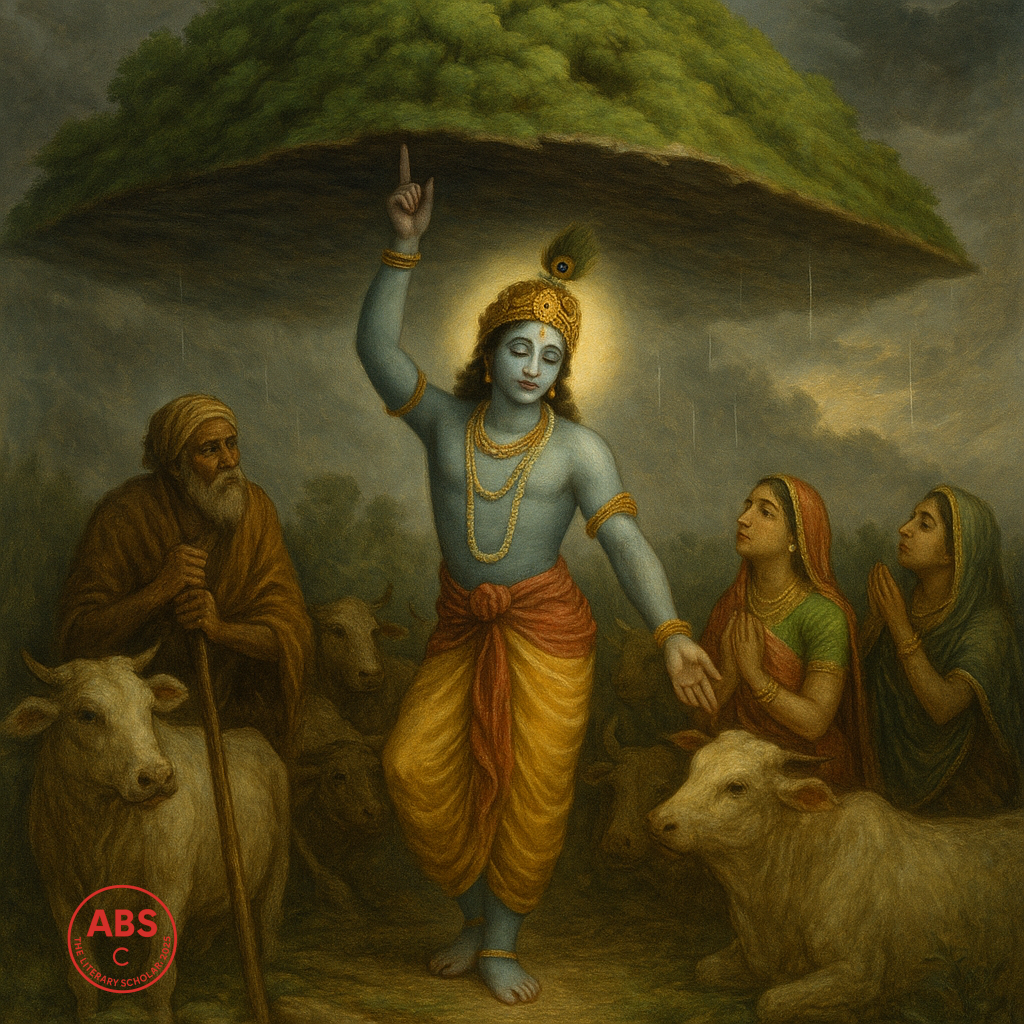
T.S. Eliot’s The Waste Land: A Poem for When the Soul Forgets Its Password
Imagine if Dante, a therapist, and an exhausted librarian collaborated on a group project during a collective midlife crisis—what they’d produce would look suspiciously like The Waste Land. Written by T.S. Eliot during one of the most emotionally depleted periods in modern history (and in his own life), this poem isn’t just about a world in ruin. It is that ruin—beautifully arranged, footnoted, and set to the quiet rustle of a society losing its inner voice.
Let’s be clear: The Waste Land is not here to offer comfort. It’s not the poetic equivalent of a weighted blanket. It’s a haunting mosaic of cracked myths, dried-up feelings, and society-wide spiritual fatigue. Eliot doesn’t guide the reader gently through post-war despair; he hurls them in, blindfolded, whispering half in German, half in Sanskrit, and all in metaphor.
And yet, it works.
Because this is a poem that doesn’t just reflect a fractured world—it teaches us how to read in fragments. And that’s why, over a hundred years later, The Waste Land still echoes. Still unsettles. Still speaks.
A Season of Emotional Instability
We begin with April. Not as a symbol of rebirth, but as a personal attack.
“April is the cruellest month…”
Only Eliot could open a poem by insulting a season and have the entire literary canon nod in agreement.
Spring, traditionally the poetic playground of hope, becomes here the great excavator of emotional ruins. Winter, in contrast, is presented as a comforting blur of numbness and tubers. It’s the first sign that Eliot’s vision isn’t inverted—it’s brutally accurate.
In The Waste Land, nothing blooms without dragging up what’s buried beneath.
Fragments, Voices, and the Art of Emotional Eavesdropping
There is no single speaker. No stable voice. The Waste Land jumps from memory to myth, from pub gossip to tarot nonsense, from a lonely aristocrat brushing her hair to an ancient prophet watching a mechanical affair unfold. It’s a poem assembled like a collage in a nervous breakdown.
But that’s the point. The world Eliot saw—fresh out of war, buried in loss, addicted to surface-level distractions—didn’t make sense anymore. So the poem doesn’t either. It reflects that disarray back at us with haunting precision.
The modern soul, Eliot implies, doesn’t live in clean lines.
It shivers in fragments, hoping someone will pick up the pieces and pretend it’s art.
Love in the Time of Wallpaper
Relationships in this poem are not romantic. They are riddled with passive aggression, silences, rhetorical questions, and the strange emptiness that fills the air when two people have stopped trying to understand each other.
A woman, perfumed and dazzling in a room that glitters with artificial elegance, pleads with her partner to speak. He replies with metaphorical rats and vague World War PTSD. That’s not an argument—that’s a mood board for modern disconnection.
And in a pub, the working-class conversation is no less bleak. The language is different, but the exhaustion is identical. A friend gossips about Lil, who’s had too many children and too few chances. The women laugh. But we don’t.
It’s not satire. It’s sociology with a side of gin.
Tiresias: The Seer We Deserve
Floating through the poem is Tiresias, the ancient prophet, gender-blending time traveler, and reluctant witness to all things human. He has seen everything. Been everything. Man. Woman. Seer. Victim. Bystander.
When Tiresias watches a joyless modern coupling unfold, he doesn’t comment. He just recognizes the mechanical sadness of it. The routine. The way passion has been replaced by performance.
Tiresias doesn’t blink. He’s blind. And he’s over it.
Fire, Water, and the Occasional Buddha
The Fire Sermon scorches away the remnants of human connection. The river stinks. The city pulses with emptiness. Sex is drained of affection. People move like ghosts with errands. Desire is no longer sacred—it’s scheduled.
And just when you think the poem can’t spiral deeper into detachment, death arrives quietly—not with drama, but with stillness. A man drowns. He forgets the sea. He forgets himself.
Phlebas the Phoenician goes under with elegance and economy. No flailing. Just dissolution. The final surrender to the poem’s quiet thesis: nothing lasts. Not even memory.
And Then Came the Thunder
But Eliot doesn’t end with silence. He ends with sound.
Thunder cracks across the mountains. The poem lifts itself from ash and whisper, and suddenly—it speaks. And not in English, of course. That would be too simple. It speaks in Sanskrit.
In the Upanishads, the gods speak not in sermons but in syllables. And so the thunder says simply:
Da.
A syllable, yes. But also an opening. A doorway. A decoding key.
The ancient sages interpreted it in three ways—for three types of beings:
Those who hoard must learn to give.
Those who overpower must learn to restrain.
Those who detach must learn to feel.
But Eliot isn’t quoting scriptures for effect. He’s offering the only coherent moral compass in the poem. Not as a solution. But as a start.
Shantih, Shantih, Shantih
The poem closes not with clarity, but with quiet.
The repetition of “Shantih” is not a promise. It’s a hope.
A whisper across the wreckage. A meditative pause that lets the reader sit with all the dust, debris, and beauty that’s come before it.
It doesn’t wrap things up.
It just invites you to breathe.
Eliot gave us no clean answers. But he gave us a language for the ruin. He didn’t repair modernity—he mapped it. And he didn’t sanitize grief—he intellectualized it so beautifully that we nodded along without realizing he was writing about us.
The poem isn’t called The Answer Sheet.
It’s called The Waste Land. And it earns the name.
ABS folds the scroll with both hands—once for the soul, once for the silence.
Signed,
ABS
The Literary Scholar
So many undone by silence, so few saved by thunder.
We buried meaning beneath the dust and called it modern.
Share this post / Spread the witty word / Let the echo wander / Bookmark the brilliance
